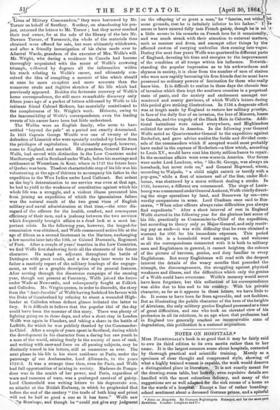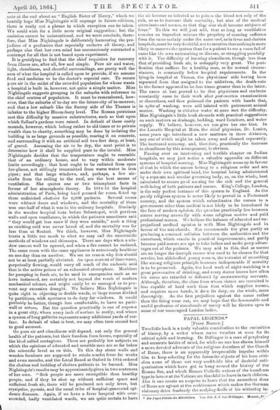NOTES ON HOSPITALS.*
Miss NIGHTINGALE'S book is so good that it may be fairly said to owe its third edition to its own merits rather than to her name. It is the largest common sense about hospitals, corrected by thorough practical and scientific training. Merely as a specimen of clear thought and compressed style, showing of what a highly trained woman is capable, the work would deserve a distinguished place is literature. It is not exactly meant for the drawing-room table, but homely, even repulsive details are handled with the most colourless delicacy, and many of the suggestions are as well adapted for the sick rooms of a home as for the wards of a hospitaL Except a line of rather boarding- school sentiment about a deceased German prince, and a spiteful • Notes on Hospitals. By Florence Nightingale. Enlarged, rind for the most part Heinitten. London: Longman and
note at the end about an "English Sister of Mercy," which we heartily hope Miss Nightingale will expunge in future editions, there is really not a phrase to which exception can be taken. We could wish for a little more original suggestion; but the omission cannot be unintentional, and we must conclude, there- fore, that Miss Nightingale is deliberately humouring the pre- judices of a profession that especially eschews all theory, and perhaps also that her own mind has unconsciously contracted a contempt for all that is not based upon experiment.
It is gratifying to find that the chief requisites for recovery from illness are, after all, few and simple. Pure air and water, light, cleanliness, and cheerful surroundings, are pretty well the BUM of what the hospital is called upon to provide, if we assume food and medicine to be the doctor's especial care. To secure pare air in the midst of the crowded population for whose wants a hospital is built is, however, not quite a simple matter. Miss Nightingale suggests grouping in the suburbs with reference to the chief centres of population. It must be remembered, how- ever, that the suburbs of to-day are the future city of to-morrow, and that a low suburb like the Surrey side of the Thames is inferior to the higher Bloomsbury level. The Roman patricians met this difficulty by massive substructures, such as that upon which Sallust's gardens were raised. In default of these costly mounds, however, which belong rather to old times or to private wealth than to charity, something may be done by isolating the building in as large grounds as possible, rearing it on concrete, and surrounding it with an artificial soil two feet deep, at least, of gravel. Assuming the air to be dry, the next point is to determine how it shall be supplied pure to the invalid. Miss Nightingale decides that the temperature ought to resemble that of an ordinary house, and to vary within moderate limits accordingly ; that heat ought to be radiated from open fire-places, not stiflingly transmitted from warm water in iron pipes ; and that large windows, and, perhaps, a few air- shafts from the ceiling to the roof, are the best means of ventilation. She quotes one or two triumphant facts in favour of her atmospheric theory. In 1814-15 the hospital administration of Paris, being hard pressed for room, fitted up three unfinished abattoirs for 6,000 patients. Several rooms were without doors and windows, and the mortality of these was one-half of what it was in the ordinary hospitals. Similarly in the wooden hospital huts before Sebastopol, with pervious walls and open ventilators, in which the patients sometimes said "they would get less snow if they were outside," such a thing as catching cold was never heard of, and the mortality was far less than at Scutari. We think, however, Miss Nightingale trusts a little too much to what we may call the unscientific methods of windows and chimneys. There are days when a win- dow cannot well be opened, and when a fire cannot be endured. The same room with the same appliances is notoriously healthier on one day than on another. We see no reason why this should not be at least partially obviated. An open current of lime-water, perpetually flowing, would carry off much of the carbonic acid that is the active poison of an exhausted atmosphere. Machines for pumping in fresh air, to be used in emergencies such as we have instanced, are certainly not beyond the reach of modern mechanical science, and might easily be so managed as to pre- vent any excessive draught. We believe Miss Nightingale is quite right in objecting to double wards, or large rooms divided 1>y partitions, with apertures to do duty for windows. It would probably be better, though less comfortable, to have no parti- wall or screen. But the question practically is one of expense in a great city, where every inch of surface is costly, and where a system of long galleries represents many additional yards of sur- face. In default of what is best, we may often turn second best to good account.
On pure air and cleanliness will depend, not only the general health of the patients, but their freedom from fevers, especially of the kind called contagious. There are probably few subjects on which the opinions of educated and sensible men are so far below the scientific level as on this. To this day stone walls and wooden furniture are supposed to retain scarlet fever for weeks and even months, and the Local Board at Oxford in 1854 ordered the clothes and bedding of cholera patients to be burned. Miss Nightingale's results may be approximately given in two sentences of her own. "Sick people are more susceptible than healthy people, and if they be shut up without sufficient space and sufficient fresh air, there will be produced not only fever, but erysipelas, Hernia, and the usual tribe of hospital-generated epi- demic diseases. Again, if we have a fever hospital with over- crowded, badly ventilated wards, we are quite certain to have the air become so infected as to poison the blood not only of the sick, so as to increas3 their mortality, but also of the medical attendants and nurses, so that they also shall become subjects of fever." To this we will just add, that so long as 'ventilation remains an imperfect science the propriety of massing sufferers front the same malady under the same roof, as in fever and cholera hospi Ws, must be very doubtful, not to mention that nothing is more likely to unnerve the system than fora patient to see a room full of cases like Ids own succumbing to disease, or struggling painfully with it. The difficulty of insuring cleanliness, though less than that of providing fresh air, is unhappily very great. The puri- fication that suffices for a healthy man, or for normal circum- stances, is constantly below hospital requirements. In the
lying-in hospital at Vienna, the physicians' side having been separated from that assigned to the midwives, the death-rata in the former appeared to be four times greater than in the latter. The cause at last proved b be that physicians and students constantly came to their work after post-mortem examinations or dissections, and thus poisoned the patients with hands that, in spite of washing, were still tainted with putrescent animal matter. Washing in chlorine water at woe met the difficulty. Miss Nightingale's little book abounds with practical suggestions on such matters as drainage, bedding, ward furniture, and water supply. We believe, however, we can give her one hint. In the Lunatic Hospital at Reis, the chief physician, Dr. Lunier, some years ago introduced a new mattress in three divisions, any one of which might be taken away and cleaned separately. The increased economy, and, therefore, practically the increase in cleanliness by this arrangement, is obvious.
Passing over an interesting and terrible chapter on Indian hospitals, we may just notice a valuable appendix on different systems of hospital nursing. Miss Nightingale sums up in favour of that in which the nurses belong to a religious order and are under their own spiritual head, the hospital being administered by a separate and secular governing body, as, on the whole, beat calculated to secure good nursing for the sick and the general well-being of both patients and nurses. King's College, London, is the only perfect instance of this system in England. As the purely religious system is never likely to prevail in a Protestant country, and the system which subordinates the nurses to a government other than medical is not likely to be introduced in the face of modern opinion, the question practically lies between sisters serving avowedly with some religious motive and paid professional nurses. We believe the balance of educated and un- prejudiced medical opinion is with Miss Nightingale and in favour of the sisterhoods. She recommends the plan partly as producing a constant collision between the authorities and the sisterhood, which results in practical improvements, and partly because paid nurses are apt to take bribes and make petty advan- tages out of the patients. We may add to this, that as nurses are no longer the decrepit crones who used to be chosen for that service, but ablebodied young wome.n, the restraint of something like strong religious principle becomes indispensable if morality is to be preserved. Again, the hard work of night-watching is a great provocative of drinking, and every doctor knows how often his cures are retarded or defeated by untrustworthy servants. Although, therefore, the class from whom sisters are recruited is less capable of hard work than that which supplies nurses, and requires more hands, it does its duty, on the whole, more thoroughly. As the first prejudices against the name rather than the thing wear out, we may hope that the honourable and useful profession of sisterhoods of mercy will be thrown open to some of our unoccupied London ladies.



































 Previous page
Previous page